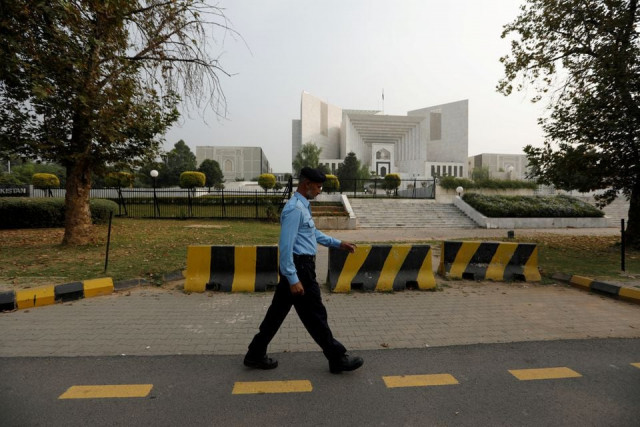Records of NAB cases must be preserved: SC
CJP says returned references in accountability law tweaks may be needed again

The Supreme Court on Tuesday ordered the preservation of the record of all the references returned in the case related to the changes in the country’s accountability law.
The SC also issued directions for these references to be digitised, with Chief Justice of Pakistan (CJP) Umar Ata Bandial observing that they might come in handy if they were reopened and heard by another court.
The court also sought the record of all these references.
A three-judge bench, comprising the CJP, Justice Ijazul Ahsan and Justice Mansoor Ali Shah was hearing PTI chairman and deposed premier Imran Khan’s petition against the recent amendments to the National Accountability Bureau (NAB) law.
Imran's lawyer Khawaja Haris, continuing his arguments, took the position that the prosecution should first prove its case.
Justice Ahsan responded that the entire burden has been placed on the prosecution.
He added that if any party deliberately made a wrong decision and then took advantage of a third one, it was not a crime.
The CJP inquired whether or not there was any place for such mistakes in the past.
The lawyer replied that NAB was authorised in the past.
He added that six major cases including the rental power one were concluded.
He told the court that all this money belonged to the people and a sum of Rs8.6 billion was recovered through references.
The lawyer argued that the recent amendments had put the third party’s financial gain out of NAB’s reach.
He added that the change in the definition of “crimes” on the accountability law had cost public money.
The court equated public money with property.
The CJP noted that the bench was still looking for a criterion to test the NAB law as public property fell under the court’s domain.
Justice Shah inquired how the court could design a law and send it to parliament.
He added that someday a citizen would approach NAB for the corruption of Rs10 and this must be stopped at some stage.
The judge asked the lawyer how could the court interfere in the affairs of parliament.
“How can the court determine what the accountability law should be like? You argue that the changes were made with malicious intentions. How can we design a law for parliament?” he added.
Imran's lawyer responded that the top court used to design laws for parliament in the past.
Justice Shah inquired whether or not judges were exempted from the NAB law.
According to the law, no one was exempted except the army, he observed.
Justice Ahsan noted that if the NAB chairman did not send the returned references anywhere, the matter would be over.
Haris replied that as fast as the references were being returned, they were not going anywhere else.
The CJP remarked that the NAB would be asked about the returned references.
He added that it was possible that these references would be filed again tomorrow or go to another court. “Everyone responsible should be held accountable,” he noted.
The NAB prosecutor told the court that committees had been formed in every region that would review the returned references.
Federal lawyer Makhdoom Ali Khan told the court that NAB was not submitting all the records to the SC.
He added that the anti-graft body was presenting only the decisions of the accountability courts to the apex court.
“What NAB is hiding from the SC is very important,” he said.
The CJP noted that the federal lawyer would have to prove that a law existed for this purpose but there was no punishment.
He added that It had been going on in newspapers and other circles that there should not be NAB prosecution on some sections, including business circles.
Justice Bandial noted that the accountability law also existed in 1947 but only politicians had been declared dishonest.
He observed that to balance the ongoing judicial process, a debate on the matter should take place in parliament.
Justice Ahsan noted that there might be a need to amend the NAB law, but he question before the court was what change was required to make. He added that the amendments were said to be carried out for the protection of a class. Later, the SC in its order wrote that NAB references, records, evidence, information and documents should be preserved.
It added that a list of everything should be compiled and preserved.
The court adjourned the hearing of the case till Wednesday (today).



















COMMENTS
Comments are moderated and generally will be posted if they are on-topic and not abusive.
For more information, please see our Comments FAQ